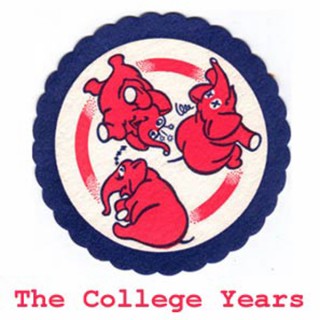Podcasts about geoffrey nunberg
American linguist
- 15PODCASTS
- 18EPISODES
- 53mAVG DURATION
- ?INFREQUENT EPISODES
- Sep 2, 2020LATEST

POPULARITY
Best podcasts about geoffrey nunberg
Latest podcast episodes about geoffrey nunberg
After the Berkeley city council votes to remove gender from the municipal code, Laura and Leah decide to investigate how language changes with the times. They talk to two non-binary students about the singular pronoun “they” and linguist Geoffrey Nunberg about what language will stick, what's a fad, and why language matters. Finally, Berkeley sociologist Cristina Mora talks about the origins of Latinx and why she uses it.
Never before has our commander-in-chief’s behavior been so puzzling, so laughable, so…troubled? This October the Litquake festival assembled a panel of experts to shed some light on the president's fundamental shortcomings. Senator Barbara Boxer addresses his political naiveté, linguist and NPR contributor Geoffrey Nunberg helps parse his verbal tics, psychiatrist Dr. Dee Mosbacher sheds light on his mental state, and comedian Will Durst talks about finding humor in this unfunny crisis. Moderated by journalist and author David Talbot. Recorded live as part of the Litquake festival, at the Swedish American Hall in San Francisco. https://www.facebook.com/litquake https://twitter.com/Litquake
In this episode of Very Bad Words, Matt talks about A-holes with UC Berkeley Linguist and author of the book, Ascent of the A-Word, Geoffrey Nunberg. See acast.com/privacy for privacy and opt-out information.
The Most Dishonest People on Earth, with Lowell Bergman, Geoffrey Nunberg, Marisa Lagos, Scott Shafer: Litquake's Lit Cast Episode 76
Litquake's second event in our "Shadow & Light" series presents "The Most Dishonest People on Earth: Journalists Respond to Trump," another glimpse of sanity in an increasingly insane world. This current political climate demands honest and unvarnished media coverage. But is the American press doing enough to tell the truth behind the lies? Are we in a spiral of spin where truth no longer matters? With Lowell Bergman, Geoffrey Nunberg, Marisa Lagos, and Scott Shafer. Recorded live at the Koret Auditorium, San Francisco Public Library. https://www.facebook.com/litquake https://twitter.com/Litquake
'BradCast' 9/2/2016: (Angie Coiro w/ Imani Gandy, Sajid Khan, Geoffrey Nunberg
independent investigative journalism, broadcasting, troublemaking and muckraking with Brad Friedman of BradBlog.com
'BradCast' 9/2/2016: (Angie Coiro w/ Imani Gandy, Sajid Khan, Geoffrey Nunberg
independent investigative journalism, broadcasting, troublemaking and muckraking with Brad Friedman of BradBlog.com
More at http://philosophytalk.org/shows/linguistics-name-calling. Sticks and bones may break your bones, but names can also hurt you. And language gives us surprisingly many ways to deride, hurt and demean – from a subtly sneering intonation to hurtful and offensive names. How does such language work? And why is there so much of it around these days? Has our acerbic political culture ushered in a new era of name-calling? Or is name calling a phenomenon as old as language itself? John and Ken welcome back linguist and NPR commentator Geoffrey Nunberg, author of "Ascent of the A-Word: Assholism, The First Sixty Years."
[r] "Weird Al" Yankovic is a master of parody music and one of the all-time bestselling accordionists. He and Jesse talk about Yankovic's multi-decade career. Plus, Bullseye's rap contributor Andrew Noz talks about some his all-time favorite tracks. Then Geoffrey Nunberg discusses the origins of the word A-hole, and how its cultural significance has changed over time. Lastly, Jesse reveals who, for his money, is the all-time king of late night talk shows.
[r] “Weird Al” Yankovic is a master of parody music and one of the all-time bestselling accordionists. He and Jesse talk about Yankovic’s multi-decade career. Plus, Bullseye’s rap contributor Andrew Noz talks about some his all-time favorite tracks. Then Geoffrey Nunberg discusses the origins of the word A-hole, and how its cultural significance has changed over time. Lastly, Jesse reveals who, for his money, is the all-time king of late night talk shows.
Geoff Nunberg says that when he told people he was writing an entire book about "asshole," both the word and the cultural condition, they laughed. But he soldiered on and produced a revelatory work in the tradition of the great exploratory essayists. Tracing the history of one of our favorite put-downs, "Ascent of the A-Word: Assholism--the First Sixty Years" maps some of the most important currents in American society over the last century.
Bob Garfield and Mike Vuolo talk to linguist Geoffrey Nunberg about his book, "Ascent of the A-Word: A**holism, the First Sixty Years." Twitter: @lexiconvalley Facebook: facebook.com/LexiconValley Website: booksmartstudios.com/LexiconValley
Bob Garfield and Mike Vuolo talk to linguist Geoffrey Nunberg about his book Ascent of the A-word: A**holism, the First Sixty Years. Learn more about your ad choices. Visit megaphone.fm/adchoices
Crash Blossoms: When Words Collide (rebroadcast) - 5 July 2010
A Way with Words — language, linguistics, and callers from all over
[This episode first aired December 12, 2009.]This week, it's headlines that make you do a doubletake, like "Child's Stool Great for Use in Garden." Martha and Grant discuss a few of these bloopers, also known as "crash blossoms." Also, if you "unthaw" something, are you freezing it or unfreezing it? Do hotcakes really sell that fast? What's the likelihood of getting people to use a new gender-neutral pronoun? And Grant shares the story behind the term "knucklehead."Some call them "crash blossoms", those funny turns of phrase that copy editors may or may not intend, like "Milk Drinkers Turn To Powder." More about crash blossoms in this article in "Good" by Mark Peters http://www.good.is/post/confusion-caused-by-crash-blossoms/.Where'd we get the expression they're "selling like hotcakes"?A Pensacola man says he's invented a gender-neutral pronoun, and wants to know how to popularize it. He's not the first to try, as shown by linguist Dennis Baron's chronology of failed attempts to create and popularize epicene pronouns.http://www.english.illinois.edu/-people-/faculty/debaron/essays/epicene.htmIf a recipe calls for "unthawed" corn, is that corn supposed to be frozen or unfrozen?Quiz Guy John Chaneski has a quiz called "Scronsonants." The object is to guess two-word phrases containing a pair of words starting with the same three consonants. Here's one: "I get a particular joy from the pain of others, but I had to learn how to do it. So I attended ___________."A Texas listener says her infant daughter is soothed by white noise. She's curious as to why it's called white noise instead of gray noise."You "knucklehead"!" Where'd we get an epithet like that? Grant tells the story about the wartime cartoon that helped popularize the term. Check out the adventures of R.F. Knucklehead in "LIFE" magazine.http://tinyurl.com/yd4zoouMore about cartoons used for war-time education:http://tinyurl.com/yed49ohGrant shares more "crash blossoms."A Southern California woman says she was caught up short when she enthused, "It's the bomb," and a 12-year-old had no idea what she was saying. Does our slang need to change as we grow older? Why do we say "the bomb"?In an earlier episode, the hosts talked about the slang term "bobo", meaning "stupid" or "inferior." Many listeners wrote in to discuss about their own use of bobo and its variants, and to point out that bobos also refers to a kind of cheap canvas shoes. Grant reports on some of their emails.http://www.waywordradio.org/zig-zag-and-shilly-shally/How should you pronounce the word "jewelry"? That prompts a conversation about the transposition of letters and sounds called metathesis--not only in jewelry, but many others including realtor, foliage, larynx, and introduce.Here's a handy word: "fomite." It means "an inanimate object that can transmit an infectious agent" like a doorknob handle or a comb infested with head lice. It also has a picturesque Latin origin. Martha explains, and shares a related word: "Dracula sneeze."If you have a word lover on your gift list, Martha and Grant have book recommendations for you. For adults, Martha recommends linguist Geoffrey Nunberg's collection of essays, "The Years of Living Dangerously" http://www.amazon.com/Years-Talking-Dangerously-Geoff-Nunberg/dp/1586487450/.For kids, Grant's been enjoying David Shannon's work, which includes, "Good Boy Fergus", "No, David," "David Smells," and "David gets in Trouble" http://www.amazon.com/No-David-Shannon/dp/0590930028http://www.amazon.com/David-Smells-Diaper-Book/dp/0439691389/http://www.amazon.com/Good-Boy-Fergus-David-Shannon/dp/0439490278/http://www.amazon.com/David-Gets-Trouble-Shannon/dp/0439050227/A woman from Dallas wants to know about a verbal habit she grew up with in her Cajun French speaking Louisiana family. It's use of repetition for emphasis, as in, “it's hot, but it's not hot hot.” Grant explains how reduplications, or a repetition of a word or part of a word, appear in many languages, including Cajun French. For more, check out Albert Valdman's "French and Creole in Louisiana" http://www.amazon.com/French-Creole-Louisiana-Language-Linguistics/dp/0306454645Mary Ellen Scullen's paper "New Insights Into French Reduplication http://books.google.com/books?id=9TL2wG3TeGkC--A Way with Words is funded by its listeners: http://waywordradio.org/donateGet your language question answered on the air! Call or write with your questions at any time:Email: words@waywordradio.orgPhone: United States and Canada toll-free (877) WAY-WORD/(877) 929-9673London +44 20 7193 2113Mexico City +52 55 8421 9771Donate: http://waywordradio.org/donateSite: http://waywordradio.org/Podcast: http://waywordradio.org/podcast/Forums: http://waywordradio.org/discussion/Newsletter: http://waywordradio.org/newsletter/Twitter: http://twitter.com/wayword/Skype: skype://waywordradio Copyright 2010, Wayword LLC.
Co-hosted by Brian Lane and Arthur Gauss, this week's show has artist Brandon Bird, author Geoffrey Nunberg, and comedians Jimmy Pardo and Shelley Berman.
YouTube, Blogs, Texting, the Web: How Are New Media Changing Politics?
How have New Media influenced elections and political governance, and shaped the language of civic engagement? Hear this panel sponsored by the Goldman School's Class of '68 Center on Civility & Democratic Engagement. Panelists: Professors Henry Brady, Bruce Cain and Geoffrey Nunberg http://gspp.berkeley.edu/
YouTube, Blogs, Texting, the Web: How Are New Media Changing Politics?
How have New Media influenced elections and political governance, and shaped the language of civic engagement? Hear this panel sponsored by the Goldman School's Class of '68 Center on Civility & Democratic Engagement. Panelists: Professors Henry Brady, Bruce Cain and Geoffrey Nunberg http://gspp.berkeley.edu/
The Future of Information Panel (Geoff Nunberg, Mimi Ito, Brewster Kahle, Brad Horowitz)
Explore the Future of Information with Geoffrey Nunberg and panelists Mimi Ito, Brewster Kahle, and Bradley Horowitz. For more information about this event please contact kristi@ischool.berkeley.edu.


















